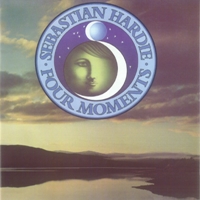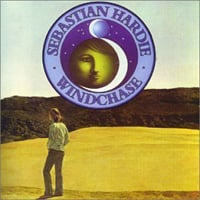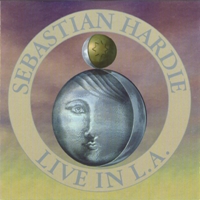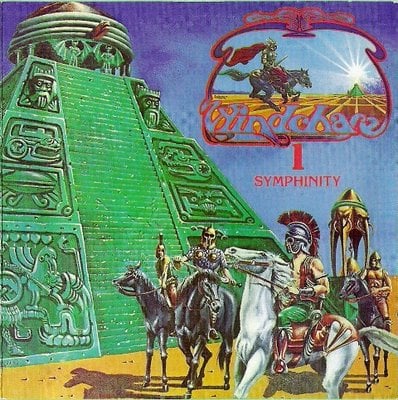Progarchives.com has always (since 2002) relied on banners ads to cover web hosting fees and all.
Please consider supporting us by giving monthly PayPal donations and help keep PA fast-loading and ad-free forever.
/PAlogo_v2.gif) |
|
Post Reply 
|
| Author | |
toroddfuglesteg 
Forum Senior Member 

Retired Joined: March 04 2008 Location: Retirement Home Status: Offline Points: 3658 |
 Topic: Sebastian Hardie & Windchase Topic: Sebastian Hardie & WindchasePosted: June 02 2011 at 10:44 |
|
Mario Daniel Millo is an Australian musician and composer from Sydney. He was a member of symphonic rock group Sebastian Hardie from 1973 to their disbandment in 1977. He then joined Windchase before embarking on a solo career as a composer of film and television soundtracks scores. I got in touch with him for the Sebastian Hardie and Windchase story. ###################################################################################
Where were you born, what was your
musical upbringing and which bands/artists inspired you to take up
music ?
I
was born in Sydney, Australia - May, 1955 soon after my Italian
parents migrated here to start their new life.
My
father had a great passion for music and was a multi instrumentalist,
however, like me, his main instrument was guitar. He taught me
to play the mandolin at age five and then on my eighth birthday
presented me with my first 3/4 scale acoustic guitar. He taught
me the basics and after some months I began listening and teaching
myself instrumentals by The Shadows…Hank Marvin was my hero!
Your first band was the then blues
band, turned into prog rock band Sebastian Hardie. How and when did
you join them ?
I
wasn’t actually part of the original Sebastian Hardie, I joined
late 1973.
The
first band I was in was called The Wanted. It wasn't long
before I branched off with another guitar player/singer (Peter
Stanley) and we started a new band called The Menu in 1967. The
Menu played pop covers of the time which included songs by The
Shadows, Beatles, Stones, Bee Gees, Animals and many others. The
first song I ever wrote was called "Love and Affection"
which was recorded and entered in a band talent quest, but we did not
win.
In
1969, The Menu, by then, had gone through a complete line-up change
and once again entered in a "battle of the bands" quest
sponsored by the leading rock radio station in Sydney at the time,
2SM. The quest was called "The 2SM Pepsi Pop Poll".
This time we were the winners and with that came a recording contract
with the Australian record company "Festival Records" and
the band was also put on the books with one of the biggest music
booking agents in Sydney. The agency was called "Cordon
Bleu" and they represented many Australian artists, one of which
was the original "Sebastian Hardie".
In
those days it was common place for two bands to share the same gig,
rotating sets between bands throughout the night. This is how I first
met the guys in Sebastian Hardie.
The
Menu had a name change and became The Clik. We recorded
two singles with Festival Records which received mild success
and the band was very active in the local live scene. By 1973,
The Clik had gone through a complete line-up change several times and
was coming to the end of it's time. By then I had written
several original songs and was invited to join Sebastian Hardie as
guitarist/vocalist which I accepted.
It
was around November of 1973 when I officially joined SH, however, I
jammed with the band many times earlier that year and it was the
jamming that brought us together…there was a special chemistry when
we played together. 
Please tell us more about the
legendary Four Moments album from 1975
Around
the time I joined Sebastian Hardie, I was influenced by bands such as
Chicago, Yes, Santana, Mahavishnu and many others. It was "Close
to the Edge" by Yes that interested me in the concept of writing
an extended piece of music, re-occurring themes etc. Although
now as I'm thinking about influences, my previous band The Clik
performed the entire side of Abbey Road (Beatles).
For
many years I had various small recording setups and recorded many
original ideas, some of which were the building blocks to "Four
Moments".
I
also remember going to see Dutch band "Focus" in concert,
here in Sydney, 1973 with SH drummer Alex Plavsic. We were both
blown away that night by their performance and given that we were
already influenced by the bands mentioned earlier, the direction for
Sebastian Hardie became clear.
The
writing of Four Moments, which I still have on two track tape, was
just an amazing door opening for me - I realised I needed to hear
defined structure in the melody, harmony and bass parts and the
importance of their interactions. When the band got together to
rehearse, I lead them through these structures and things started to
gel straight away. It wasn't long before we were performing "Four
Moments" in front of audiences and the reaction was fantastic!
I
will add, that prior to performing Four Moments the band had already
become recognised as somewhat of a musical event, in that we
performed our own extended version of Michael Oldfield's "Tubular
Bells" which was a huge success at the time. When we
played at regular rock gigs (Australian Pubs), where mainly dancing
would take place, the night would turn into a concert vibe…great
times!
Jon
English, massively successful male vocalist here in Australia in the
70's, also the original singer in Sebastian Hardie prior to me
joining was already an established recording artist with Polygram.
It was with Jon English and Sebastian Hardie co-producing "Four
Moments" that Polygram signed the band and gave us clear reign
to record our stuff, even though they knew it wasn't the normal
commercial outcome.
Fortunately,
as soon as Four Moments was ready for release, we were booked to tour
with Focus on their second Australian Tour, around May 1975. It
was the perfect audience and SH were the perfect support act. The
tour was a huge success for us and Four Moments achieved "Gold
Record" sales, and the single "Rosanna" was in the top
twenty in the national radio charts.  Please tell us more about the follow
up album Windchase from 1976.
The
Windchase album was recorded about a year after Four Moments. Unlike
FM, where we had performed it several times before recording,
Windchase had not ever been "road tested" prior to the
recording which was frustrating. I remember that Polygram was
pushing for us to produce a follow up album in order to keep the
momentum happening, understandably.
By
that stage the band was in demand to perform concerts and as much as
we would have liked to have spent more time producing Windchase,
Polygram pushed for a release to coincide with a forthcoming Santana
tour (1976 tour of Australia) , for which we were the support act.  There is also a live album called
Live in LA, released in 1997. When and in which venue was this album
recorded ?
Live
in LA was recorded in Los Angeles at The Variety Arts Centre,
November, 1994. It was a one off performance, headlining
Progfest ‘94 (LA’s annual Progressive Rock festival at the time).
The
festival was a blast, there were around ten bands, maybe more, from
all over the world and an audience that also travelled in from all
over the globe.
It
was the first public performance for Sebastian Hardie since we split
in 1976. As it was such an occasion, we thought it was
deserving of a cd release. There is also a compilation video of
Progfest '94, released through Musea, which features excerpts from
all the bands.
Then Sebastian Hardie broke up and
Windchase was formed. Please tell us more about why and what
happened.
I
guess the main reason we split was financial difficulties and to some
degree musical differences. To keep a band together,
performing/touring is essential. The geography of Australia is
immense with only a small population compared to USA, Europe etc.
Unlike the USA where a band could tour east to west coast
playing at hundreds of cities, here in Oz, from Sydney to Perth you'd
be lucky to do half a dozen shows. We did not have as much
support from radio and media as the more commercial style bands had,
so it was difficult for a band such as ours to make a living. Toivo
(keyboard player) and I were also feeling we needed to embark on a
different musical direction at that time.
 Windchase's only album is the
Simphinity album from 1977. Please tell us more about this album.
After
the split of SH, Toivo and I, with a new rhythm section, continued
performing as Sebastian Hardie. The name "Sebastian
Hardie" became a contentious issue between us and the
original SH rhythm section so we decided down the track to rename our
new band Windchase, feeling that it had a connection back to the last
Seb Hardie album, and therefore just a new branch of the old band.
The
first album recorded by Windchase, Symphinity, was quite different to
SH. We teamed up with friend Gerry Stevens (recording engineer)
and signed a recording contract with Festival Records. Again,
we had license to produce what we wanted and both us and Festival
Records were excited with the album that was produced.
By
then, 1977-78, the music business here in Oz was becoming more and
more selective in a rigid commercial sense. It was even more
difficult for a band like ours to stay in business. Again it
was financial pressures that were the main reason for the end of
Windchase and to some extent differences in musical directions with
myself and Toivo.
When did Windchase broke up and you
started out on a successful solo career.
It
was towards the end of 1977 early '78 when Windchase ended, and I
embarked on my solo career soon after.
What is your best and worst memories
from Sebastian Hardie and Windchase ?
There
were definitely more good memories than bad.
Recording
our very first album Four Moments was one of the highlights for
Sebastian Hardie. Just hearing my writing come together in a
great recording studio was brilliant, and I remember as well that the
band had so much fun doing it all. So many practical jokes and
so many laughs.
Touring
with Focus and Santana was such a buzz for the band. It was an
amazing thing for me personally as I had admired both Jan Akkerman
(Focus) and Carlos Santana for many years. A personal highlight
of the Carlos Santana tour was being invited on stage to play
alongside Carlos on the last concert in Sydney and it’s a moment I
won’t ever forget.
We
had such an amazing time just about everywhere we performed and the
band always managed to reach a high and audiences felt the vibe.
Sebastian Hardie’s final performance in 1976, before the split, was
at The Dallas Brooks Hall in Melbourne, Australia and I recall we
performed an outstanding show. We had to wait for another
eighteen years to get the opportunity to feel that magic again, at
Progfest in LA in November 1994 … on stage it felt as if no time
had passed.
Our
tour of Japan in 2003 was another major highlight, especially for me,
in that I had a new solo album out, “Oceans Of The Mind” and a
tour featuring both the Mario Millo Band and Sebastian Hardie was
organised. To kick off the tour, the two bands performed a one
off concert in Sydney at The Metro Theatre. It was a blast and the
entire show was recorded on video and multi-track audio. The
recording and video is yet to be released, but our intention is to
release them both in the future. We had fantastic audiences in
Japan at the concerts and I am definitely planning to tour Japan
again one way or the other.
Later
in 2003, Sebastian Hardie performed as Special Guests in Sydney and
Melbourne on the YES 35th Anniversary Tour. The two nights were
fantastic and it was such an honour to perform at these concerts.
Windchase
also had many fantastic times, though the music industry had become
harder and everything became more serious by then. Recording
the Symphinity album was a real buzz and doing gigs was always good.
Unfortunately we never had the opportunities that SH had re touring
with international acts.
You are a very famous composer in
your own right. Far more than Windchase and Sebastian Hardie ever
was. But then again; we in ProgArchives are true nerds. But please
tell us more about your albums, your movies and your career as a
composer. How would you describe your music ?
My
music has mostly tended to be thematic. Four Moments, for
example, was one of the main reasons Sebastian Hardie became known as
Symphonic Rock. I've always veered toward strong melodic and
harmonic ideas. My first solo album Epic lll (circa 1978-79),
continued around these lines and it was around this time that I began
to broaden my horizons re my career.
Composing
for film was a natural progression as I was always interested in
orchestral music. In 1978, I had the opportunity to co-write
the music for an Australian television mini-series called
“Against The Wind”. Both the series and soundtrack album
were a hit here in Oz, as well as Scandinavia and several other
countries.
“Against
The Wind” kick started my career as a film composer. From
around 1983, composing for film became my focus and for the twenty
years that followed I was deeply entrenched writing and producing
film scores. It's been a fantastic journey, giving me opportunities
to compose for orchestra where I've developed my skills in
arrangement, orchestration and to some degree in conducting. I'm
very grateful to have been acknowledged by my peers and to have
received many awards for my scores.
I
do intend, at some point in the future, to compose more music for
orchestra, not necessarily for film, but more of my own music
projects. It
is my understanding that you will tour again this year with both your
own material and Windchase/Sebastian Hardie material. Please tell us
more about these plans
At
present it's on my bucket list. Once my producing commitments
free up, then I can focus on the possibility to tour again, more
likely to be 2012. I will love it if it does happen as I miss
playing and touring a lot.
Recently
I've been producing two young artists that I'm very excited about and
their debut albums will soon be released.
My
daughter Jess Millo (singer songwriter) and her band The Scarletts -
album titled "Outside looking In", and Nick Latta (singer
songwriter) with his album "Filling The Void", which I
also played guitar on. Producing these two albums has been such a
joy for me. I've been able to impart my 40+ years
of experience and knowledge in music and we're all ecstatic with
the final results of both albums.
I
mention them because my plan is to tour in an entourage which will
include Nick’s band, Jess and The Scarletts and selected musicians
that I’d love to bring along. I also have a bunch of guys (“Men
From Mars”) that I wrote and recorded an album with a few years
ago. Doing some gigs with those guys would also be on the wish list.
We’ll have to wait and see what develops next year.
Re
Windchase / Sebastian Hardie, at this stage, there are no plans to
tour either band, but I wouldn’t rule it out.
As the prog rock nerds we are; is
there any of the current generation prog rock bands you like or have
you lost touch with the scene?
I
must confess that I have lost touch with what's happening in prog
world. However, judging by the enthusiasm I witnessed at Progfest
'94, even back then, Prog Rock was certainly alive and well and I
imagine it is even more so now days which is fantastic!
To wrap up this interview, is there
anything you want to add to this interview?
I
thank you for the opportunity and interest re this interview and I
hope at some point we meet while I'm on tour.
All
the best Thank you to Mario for this interview His homepage is here Sebastian Hardie's PA profile is here Windchase's PA profile is here |
|
 |
|
Finnforest 
Special Collaborator 

Honorary Collaborator Joined: February 03 2007 Location: The Heartland Status: Online Points: 16914 |
 Posted: June 04 2011 at 07:42 Posted: June 04 2011 at 07:42 |
|
Thanks Torodd, I enjoyed that one!
|
|
 |
|
Post Reply 
|
|
| Forum Jump | Forum Permissions  You cannot post new topics in this forum You cannot reply to topics in this forum You cannot delete your posts in this forum You cannot edit your posts in this forum You cannot create polls in this forum You cannot vote in polls in this forum |